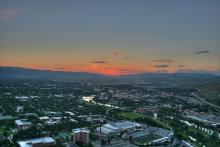In Missoula, Montana, a Wireless Mesh Network Builds Community and Connections
A year after a group of local broadband champions got together to see how they could improve Internet access in Missoula, Montana, the Missoula Valley Internet Cooperative has successfully raised funds and designed, deployed, and launched a wireless mesh network delivering 150 Megabit per second (Mbps) symmetrical service to more than 50 of 550 pre-registered households for, on average, $40-60/month. The community-owned option has injected some welcome competition to a stagnant local broadband market, with a second network already in the planning stages in a community to the north.
Both efforts are being driven by the Pacific Northwest Rural Broadband Alliance (PNWRBA), a Missoula, Montana-based nonprofit aiming to build resiliency, local capacity, and expand quality Internet access to the region by making use of a variety of community-oriented business models. The nonprofit serves not only to coordinate grassroots organizing efforts, but provide technical assistance and lead policy engagement with local leaders. It is running a dual mission. First, to bring faster and more affordable Internet access via a community-owned model to the area. And second, to prove out a series of models in the region with the hopes of generating additional community-based approaches to improving broadband in the region and beyond.
Grant Creek



